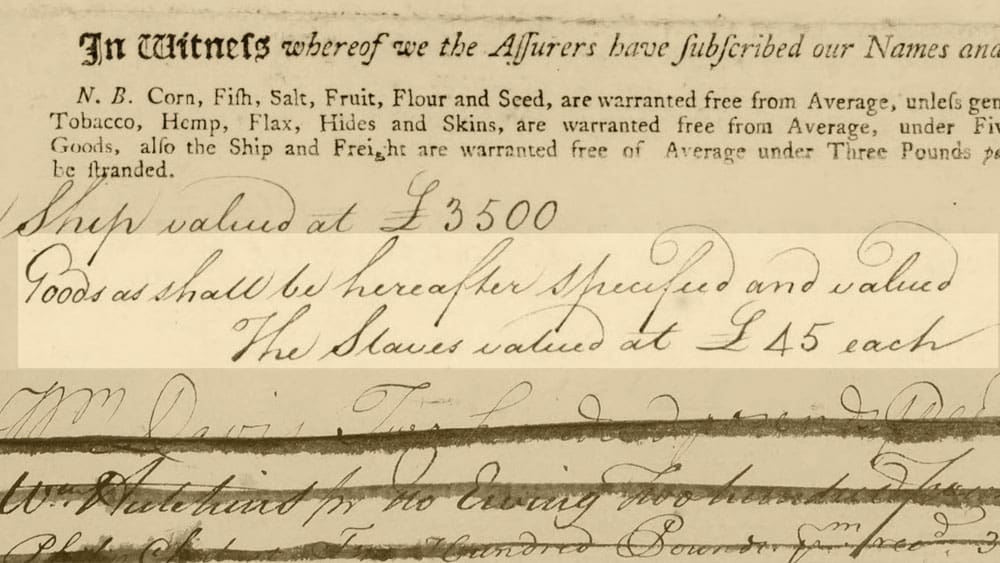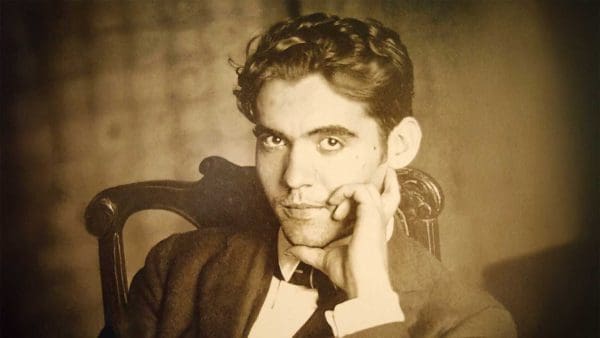The clause is among the surprising details uncovered in Underwriting Souls, a public, digitized archive and collection of exhibits related to the history and role of insurance in making the transatlantic slave trade possible. Developed by sociologist and historian Alexandre White, the archive was assembled from documents and objects from the collection of Lloyd’s, a London-based insurance market that was active during the legalized British slave trade.
“We gain something from taking seriously these seemingly dry financial archives,” says White, assistant professor in the Department of Sociology. “What they tell us are both stories of dispossession and oppression, but also stories of resistance to slavery, stories of Africans challenging and confronting enslavement.”
Scrawled on the battered parchment of a document outlining policies for the Guipuzcoa, a slave ship traveling from Liverpool to the African coast and Cuba, are the words, “Free from particular average by insurrection under 5 per cent.” In the dispassionate financial language of an insurance policy, the clause notes how much the Guipuzcoa’s underwriters would cover in damages to the ship or loss of value in enslaved people—each individually insured for 45 British pounds—due to their deaths in an insurrection.

Source: underwritingsouls.org/digitized-corpus/slave-ship-policies-for-the-guipuzcoa
Uncovering new truths
After Lloyd’s issued a formal apology in 2020 for its role in the transatlantic slave trade, White secured funding from “Black Beyond Data” (a JHU research project analyzing data to uncover new truths about Black history) and approached the insurance market about collaborating to digitize its related materials. White and graduate student co-lead Pyar Seth took several research trips to the United Kingdom to learn more about the materials—and the people and ships detailed within.
Along with revealing a wide and sophisticated business network of slave ship owners and underwriters, White and Seth also found that many of the key individuals named in the archive’s documents had personal experience with slavery. They owned plantations and slave ships, and sometimes captained voyages. The owner of one of the archive’s two risk books, each documenting dozens of slaving voyages, was born in Prince George’s County, Maryland, ran a tobacco brokerage with his brother, and, according to census data, lived on a property owned by his brother with more than a dozen enslaved people.
“The business of insurance was, for many of these men, part of a much larger set of business empires organized around the enslaving of people and the profiting from the products that they produce,” White says.

What [the archives] tell us are both stories of dispossession and oppression, but also stories of resistance to slavery, stories of Africans challenging and confronting enslavement.”
Alexandre White
Underwriting Souls includes several insurance agreements and two full insurance agreements pertaining to a slaving ship as well as two risk books documenting dozens of slaving voyages. Also included are photographs of related objects, such as an ornate, trophy-like silver cup and cover that was gifted by Lloyd’s underwriters to a slaving ship captain for protecting his ship from French privateers. (Lloyd’s had no financial involvement or editorial authority in the Underwriting Souls project, White says. All materials were independently peer reviewed.)
The exhibit also features Uprising & Resistance, a volume of poetry and art by Black writers and artists as a response and counterpoint to the distressing and violent material documented in the archive. “Underwriting Souls attempts to speak to the practices of dehumanization that are occurring in the process of insuring slaving voyages,” White says. “What’s being underwritten are not just ships and cargo, but living, breathing people who are enslaved.”




